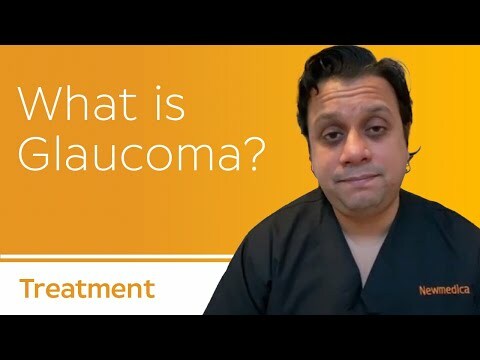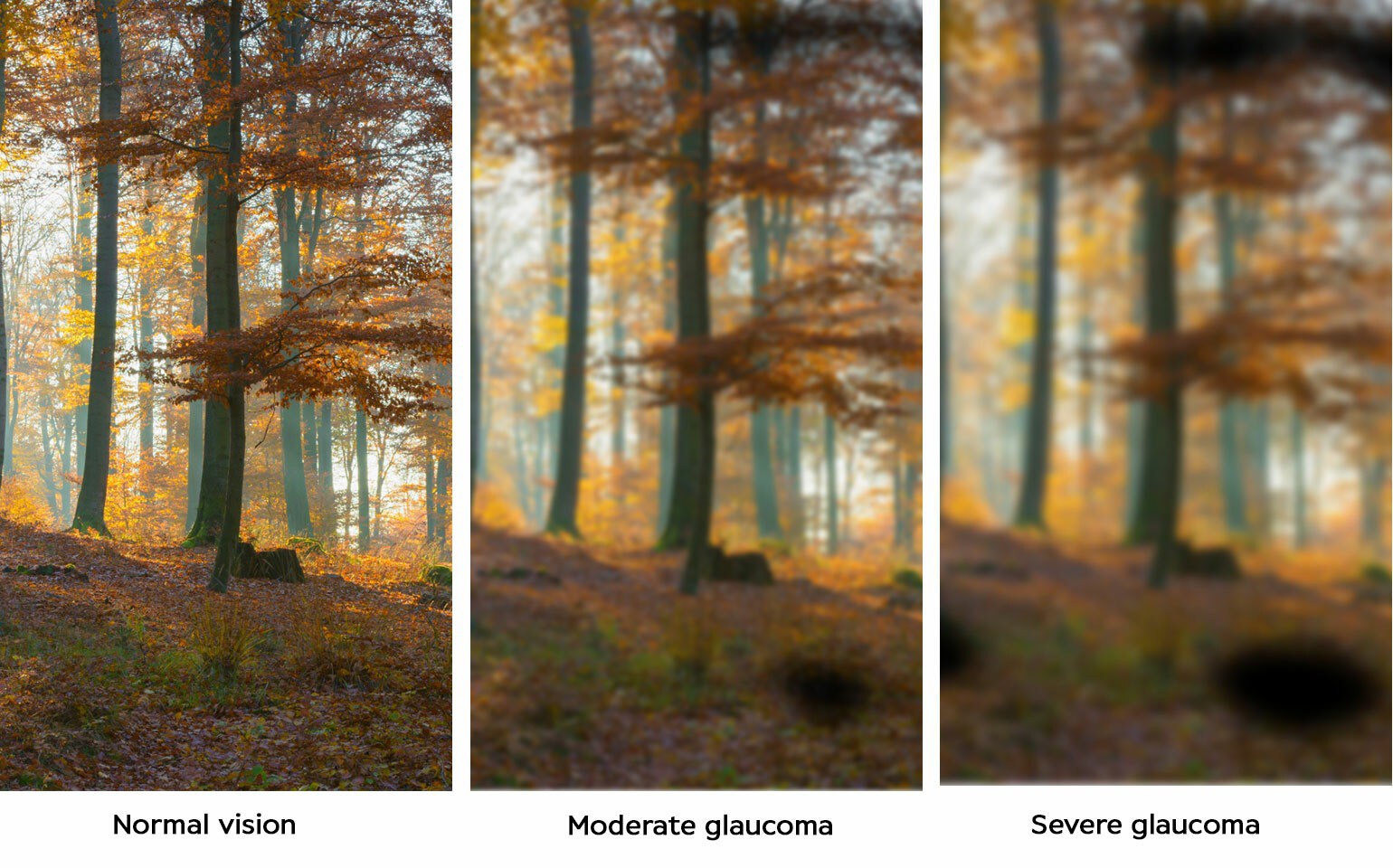I felt very safe when I was there. There were no fears about COVID. It’s all very professional and well organised. I can’t praise them enough.
June’s story
Read story
Glaucoma is a name for a group of eye conditions that cause gradual damage to the optic nerve, which is usually due to raised pressure inside the eye. It usually affects both eyes, but one eye can sometimes be a bit worse. Glaucoma can ultimately lead to loss of vision, so it’s really important that the condition is managed.
Learn more about glaucoma with Raj Hanspal, consultant ophthalmologist, glaucoma specialist and partner at Newmedica Bury St Edmunds and our eye clinic in Ipswich.

The problem with glaucoma is that symptoms don't tend to appear until it’s almost too late to treat it. The loss of side (peripheral) vision happens first, and this can be picked up, along with raised pressure, by an optometrist during your eye test.
One uncommon type of glaucoma, known as acute angle closure, can start with a sudden and painful build-up of pressure. This is an eye emergency with a lot of pain and blurred vision, but it is preventable and can be treated. If you ever experience symptoms like these, seek help straight away from your optometrist, registered eye clinic or casualty department.

Your eyes are filled with a fluid called aqueous humour, which your eye is constantly producing. The fluid normally drains away from the inside of the eye and the pressure stays constant. If the fluid can’t properly drain away, it can cause pressure to build up within the eye. This raised eye pressure is called ocular hypertension.
Glaucoma can develop when the built-up pressure starts to damage the optic nerve, which is the link between your eye and brain, resulting in a change in vision.
In the acute type of glaucoma, there is a blockage in the eye’s draining system which causes a very sudden rise in pressure. This often happens in people who are quite long-sighted or have smaller sized eyes.
During regular eye tests with your optometrist, they’ll carry out a few tests to check for signs of glaucoma. That involves checking your eye pressure with a puff of air test, assessing your field of vision and having a look at the health of your optic nerve.
If they think you might have glaucoma or ocular hypertension, they’ll refer you on to specialists like us to confirm a diagnosis and get you started on a treatment plan to help protect your vision.
If you’ve been diagnosed with glaucoma, ocular hypertension, or as being at risk of glaucoma, it’s really important that your condition is monitored regularly by a specialist. Treatment will vary from person to person, but glaucoma is typically treated in three ways: monitoring, use of eye drops, and occasionally surgery. In the vast majority of cases, treatment can stop the damage caused by glaucoma.
For many people, daily application of specialist eye drops may be the only treatment they need.
They help to reduce your eye pressure by allowing the eye’s fluid to drain more easily or by reducing the amount of fluid produced in the eye. You may need to try out a few different types in order to find the right ones for you, and it’s likely that you’d need to use eye drops for the rest of your life to help make sure your vision protected.
To make sure that everything is working well, your eye pressure is under control and your vision is stable, you’ll be asked to come back for regular check-ups with your ophthalmologist.
Laser treatment (selective laser trabeculoplasty, or SLT) is also often useful. Recent studies and the National Institute for Health and Care Excellence (NICE) have recommended using SLT in early cases of glaucoma and this could mean that you won’t need eye drops. This involves using short pulses of light to gently help lower the pressure inside the eye, by helping the fluid to flow out of the eye more easily.
In some cases of acute angle closure glaucoma, we also use a treatment called YAG laser peripheral iridotomy.
In a small number of cases surgery may be required to reduce pressure in the eye. The most common surgical procedure is called a trabeculectomy. Your consultant will advise you if this type of surgery is recommended and talk you through what’s involved.
Where can I get glaucoma treatment near me?
You can find your nearest Newmedica clinic that provides glaucoma management and treatment here.
How much does the treatment cost?
If the Newmedica clinic that you choose is able to offer NHS glaucoma treatment, then all of your treatment costs with Newmedica are fully covered, with no additional cost to you.
Alternatively, the service may be available privately, either through a private medical insurance or by paying yourself. Here are our private glaucoma treatment prices
Here are our private glaucoma treatment prices:
- SLT laser (one eye) – £795
- SLT laser (both eyes) – £995
- Glaucoma surgery – from £2,995
Check-up costs start at £195 for new patients and £125 for follow-up appointments with diagnostic tests on top.
Do Newmedica offer this service to NHS patients?
Please contact your nearest Newmedica clinic to find out if this service is available as an NHS treatment.
How do I get referred?
Your optician or GP will discuss the various treatment options available to you and where you can choose to have your treatment. You’ll be able to take the time to decide where you’d like to be treated, and your GP or optician will make the arrangements for your referral to Newmedica.
If you’d prefer to go opt for private glaucoma treatment, you can get in touch with us directly. If you have private medical insurance, they might want some more information before you make your claim. You can find all the details on our private referral page.
Building 720, Waterside Drive, Aztec West, Almondsbury, Bristol, BS32 4UD
Newmedica Guernsey, Specsavers Optical Group, La Villiaze Road, St Andrew, Guernsey, GY6 8YP
Hadrian House, Balliol Business Park, Newcastle Upon Tyne, NE12 8EW
Forder House, 20 William Prance Road, Derriford, Plymouth, PL6 5WR
Unit 2, Anchorage Ave., Shrewsbury Bus. Park, Shrewsbury, SY2 6FG
Buckland House, Langley Business Park, 10 Waterside Drive, Langley, Slough, Berkshire, SL3 6EZ
3 Falcon Gate, Shire Park, Welwyn Garden City, Hertfordshire, AL7 1TW
If you think you have an eye condition, you should see your optician or GP for a detailed assessment. They’ll go through all the options available and tell you where you can have your treatment.
The referral process will differ slightly depending on whether you want to be an NHS or private patient. You’ll find all the information you need on our NHS and private patient pages.
Are you a health care professional?
Find out how to refer a patient.
Find details about our private
options and how to get started.
Self-referring? Call 0800 4096 792
